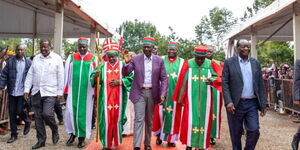The debate surrounding the potential abolition of the National Government Constituency Development Fund (NG-CDF) has garnered significant attention in Kenya.
This proposal, championed by Nominated Senator Tabitha Mutinda, aims to reduce government expenditure as an austerity measure.
However, it has sparked a contentious conversation about the implications for development in Kenyan constituencies and the education of the vulnerable in society.
Senator Mutinda argues that abolishing the NG-CDF would help streamline government functions and address the country's pressing debt issues.
According to her, the overlapping roles between national and county governments in development projects create inefficiencies that could be eliminated by centralizing development efforts.
She believes that redirecting the funds allocated to NG-CDF towards debt repayment would be a prudent financial move.
Mutinda's stance is rooted in the belief that Members of Parliament (MPs) should focus on their legislative duties rather than getting involved in development projects.
She contends that development should be left to the national and county governments, which are better equipped to handle such functions without the complexities and potential misuse associated with the NG-CDF.
This perspective resonates with a section of the population, particularly the younger generation, who are disillusioned with the current political and economic landscape.
In a panel discussion at KBC, Mutinda urged MPs to support the proposal, stating, “MPs should agree to the scrapping of NG-CDF once they return from recess. The MPs must demonstrate leadership and sanction CDF removal. We will solve the majority of our problems if we get rid of CDF.” She further emphasized that the billions of shillings allocated to the fund could be better used for repaying the country's mounting debt.
“Let development be handled at the National and County level. We want to hear MPs both from the Majority and Minority sides coming out and declaring support for the abolition of CDF. This is what Gen Z who are on the streets want to hear. If we do that, we are okay,” she reiterated.
On the other side of the debate, critics of the abolition argue that the NG-CDF plays a crucial role in grassroots development.
One of the prominent voices against this move is Lurambi MP Titus Khamala, who emphasizes the tangible benefits that the fund has brought to local communities.
In an exclusive interview with Kenyans.co.ke, Khamala, who sits in the National Assembly's CDF Committee, provides a firsthand account of the positive impact of the NGCDF, particularly in education and infrastructure.
“Gen Zs have misunderstood me. CDF is a people’s fund and I sit on the CDF committee of the National Assembly. We are the ones who oversight CDF across the country and some of us have been around for many years and we have seen what it was like before CDF and when CDF came in place,” Khamala stated.
He acknowledged that while misuse of funds is a concern, it is not unique to the NG-CDF. “Of course, in every sector, people will misuse funds, it is not only in the CDF place but now, there is a national conversation that sanity must be in every area and CDF cannot be left alone. But there are so many things the MPs have been doing with the fund.”
Khamala highlights that the NG-CDF has been instrumental in providing bursaries to students, building classrooms, and constructing police stations and chief offices.
These projects, he argues, are critical for local development and are often overlooked by the national and county governments.
The vocal MP raises concerns about the bureaucratic challenges and inefficiencies that could arise if these funds were centralised in Nairobi.
“Even as an MP, you do not sign for the money. You do not procure, you literally oversight and point out areas that need improvements,” he explained.
“People are now having a conversation that the CDF must be removed because of misuse. If you listen to Senate speeches, they claim that Parliament has better cars than the Senate and they think that MPs are getting that from proceeds of corruption. This notion that we buy high-end cars, I don't know where it is coming from.”
Khamala refutes the notion that MPs misuse the NG-CDF funds for personal gain. He clarifies that MPs do not directly handle the funds; rather, they oversee and identify areas that need development.
The procurement and disbursement processes are managed by committees, ensuring a level of oversight and accountability.
The potential consequences of abolishing the NG-CDF are far-reaching, particularly for the beneficiaries of the fund.
Khamala points out that the majority of those who receive bursaries are young people, including Gen Z, who would be adversely affected by the loss of this financial support.
The fear is that without the NG-CDF, the funds may not reach the intended recipients, especially those in rural areas, due to the bureaucratic hurdles associated with central government processes.
“Because the fund has come under sharp criticism and my colleagues were quiet about it, I said let me talk because if I keep quiet then it means that I am hiding something. I said let me be the first one to say no. If this one is what will make us to be called MPIGS, why can we let it go? So that citizens can now go pick this money from the Treasury or another form whether it is in the county or from the Ministry of Education,” Khamala stated.
He continued, “But you see, Gen Z will be the first ones to suffer because, in that function, we had brought over Ksh4 million to give bursary and 99.9 per cent of the beneficiaries were the Gen Z. So, I thought, if you remove this money from here and take it to Nairobi and the bureaucracy of Nairobi, how sure are we that our people in the village will get the money? Because even before CDF, the money was there under DDC but did we ever see the money? So anything you want to put in a pool in Nairobi, forget about it. If there would have been development at the ward and constituency level, that is money you can monitor quickly and if there is misuse you can flag it down.”
Khamala emphasizes that the NG-CDF enables local oversight and accountability, which is often lacking in larger, more centralized funds.
“Look at counties, there are some counties where you can’t see anything and you just hear that billions have gone there but if you follow in every constituency you can at least see something in the name of CDF,” he argued.
“If the people don’t want us to handle CDF let us come out and say we are ready to relinquish the fund but as we relinquish, there are going to be consequences. The consequences are those who have been flocking to the MPs’ homes for school fees, and development, and others will not come to the MPs' homes. If the money is reverted to Machogu then they will have to go look for Machogu or the county government.”
The NG-CDF has undeniably transformed many communities by funding projects that may not have been prioritized by other levels of government.
Its abolition, therefore, raises critical questions about the future of grassroots development in Kenya.
While the need for fiscal prudence and efficient government spending is clear, the challenge lies in balancing these objectives with the equally important goal of ensuring equitable development across all regions.
Khamala suggests that instead of outright abolition, there could be reforms to address issues of misuse and enhance transparency.
The discussion should involve all stakeholders, including the public, to ensure that any decision made reflects the will and needs of the people.
“NG-CDF and bursary come in one fund but you have to now allocate bursary according to the constituency’s needs. We have constituencies with only 3,000 students, I have a constituency with over 20,000 students, and we receive almost the same amount. Some places have very few students and they get a lot of money and you do not know how much money they receive or what goes on. Here, I can have maybe around Ksh50 million which is not enough in most cases,” he explained.
He concludes by calling for a more nuanced conversation about the future of the NG-CDF.
“I think that when Parliament resumes, then it will become a conversation on the floor of the House. My idea is, if we keep quiet, what message are we sending to Kenyans? If there is a conversation that NG-CDF should be de-linked from the MPs, we can’t just keep quiet. We should come out and explain what it does but we are listening to you. We can also say if Kenyans think it is not a good fund, we can let it go but say the consequences and let Kenyans decide,” the MP stated.












